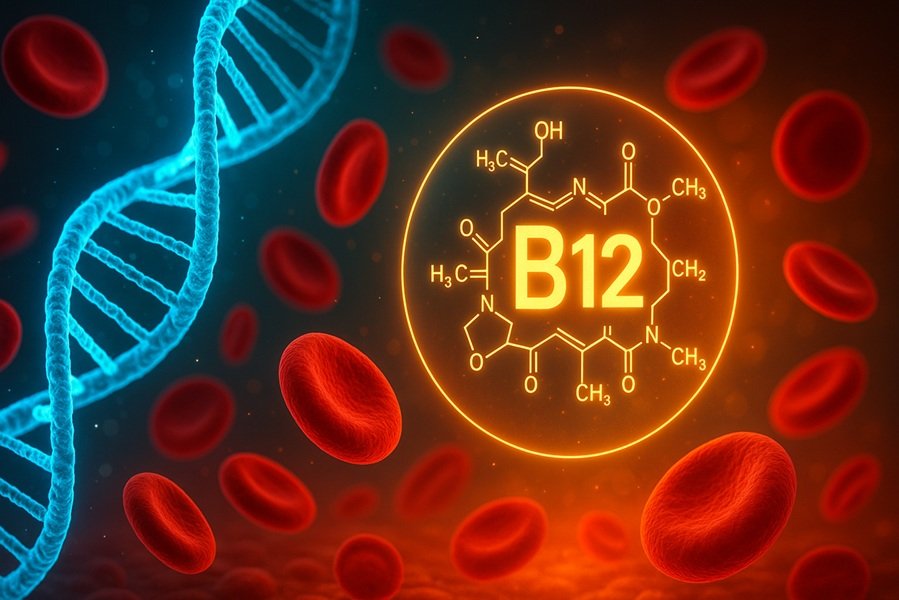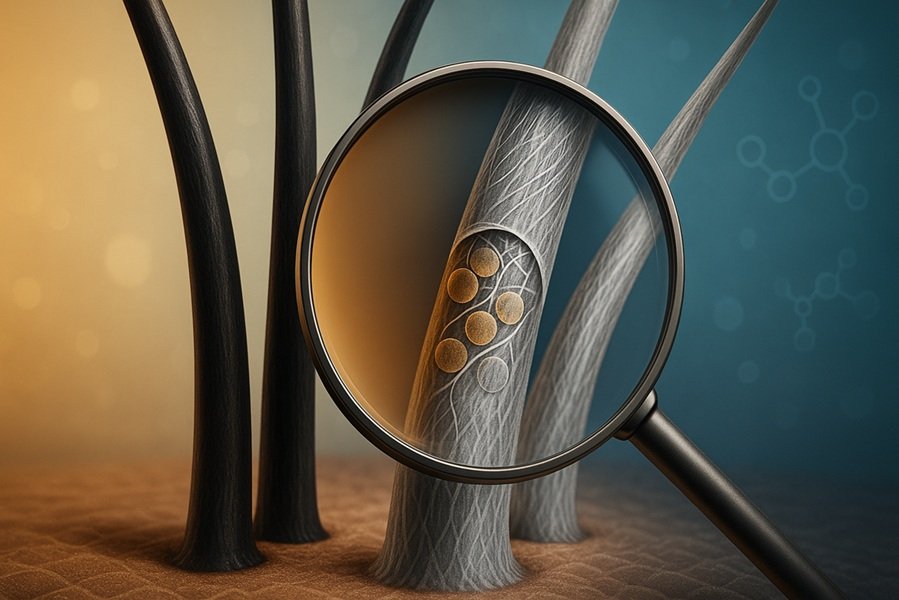
Introduction
Vitamin B12, also known as cobalamin, is a water-soluble vitamin essential for the proper functioning of the brain, nerves, and blood cells. Despite being required in small amounts, its deficiency can lead to serious health issues like anemia, fatigue, and neurological disorders.
In today’s fast-paced lifestyle, many people — especially vegetarians and older adults — are at risk of Vitamin B12 deficiency, making awareness and prevention crucial for good health.
What Is Vitamin B12?
Vitamin B12 belongs to the B-complex family of vitamins that help convert food into energy. Unlike other B vitamins, B12 is unique because it contains cobalt and is mainly found in animal-based foods.
It plays a crucial role in:
- DNA synthesis
- Red blood cell formation
- Neurological function
- Energy metabolism
The body cannot produce B12 on its own; hence, it must be obtained from diet or supplements.
Functions and Health Benefits of Vitamin B12
Let’s explore the major benefits and biological roles of this vital nutrient.
1. Supports Red Blood Cell Formation
Vitamin B12 helps in the production of healthy red blood cells. A deficiency can lead to megaloblastic anemia, where blood cells become larger and fewer, causing fatigue and weakness.
2. Boosts Brain and Nerve Health
B12 maintains the myelin sheath—a protective covering of nerves. It supports memory, focus, and overall brain health. Low levels are associated with memory loss, mood changes, and depression.
3. Enhances Energy Levels
One of the most well-known effects of B12 is its role in energy metabolism. It helps convert carbohydrates into glucose, providing sustained energy throughout the day. Deficiency often causes tiredness and low stamina.
4. Supports Heart Health
Vitamin B12 helps reduce homocysteine levels, an amino acid linked to heart disease. Along with folate and vitamin B6, it helps maintain cardiovascular health.
5. Aids in DNA and Cell Production
Every cell in your body needs B12 for DNA synthesis. It ensures the healthy growth and repair of body tissues, supporting skin, hair, and nail health.
6. Strengthens the Immune System
Adequate levels of Vitamin B12 help support the immune response, making your body more resilient to infections and illnesses.
Symptoms of Vitamin B12 Deficiency
B12 deficiency can develop gradually and may go unnoticed for months. Common symptoms include:
- Persistent fatigue or weakness
- Pale or jaundiced skin
- Shortness of breath and dizziness
- Numbness or tingling in hands and feet
- Mood swings, depression, or memory loss
- Difficulty walking or maintaining balance
- Swollen tongue (glossitis) and mouth ulcers
If left untreated, prolonged deficiency can cause irreversible nerve damage.
Causes of Vitamin B12 Deficiency
Several factors can lead to a lack of Vitamin B12, including:
- Vegetarian or vegan diet (since B12 is mainly found in animal products)
- Pernicious anemia, where the body can’t absorb B12 properly
- Digestive disorders such as Crohn’s disease or celiac disease
- Gastrointestinal surgery, which reduces absorption
- Old age, as absorption decreases naturally
- Chronic alcohol consumption
Natural Food Sources of Vitamin B12
Here are some rich dietary sources of Vitamin B12:
| Food Source | Vitamin B12 Content (approx.) |
|---|---|
| Clams (100 g) | 84 µg |
| Beef Liver (100 g) | 70 µg |
| Fish (Salmon, Tuna, Sardine) | 4–5 µg |
| Eggs (1 large) | 0.4 µg |
| Milk and Dairy Products | 0.9 µg per cup |
| Chicken and Meat | 1–2 µg per serving |
| Fortified Cereals | 2–6 µg per serving |
| Nutritional Yeast (fortified) | 4–5 µg per tablespoon |
👉 Tip for Vegetarians and Vegans: Include fortified plant-based milks, nutritional yeast, and B12 supplements after consulting a healthcare professional.
Recommended Daily Intake of Vitamin B12
| Age Group | Recommended Daily Allowance (RDA) |
|---|---|
| Infants (0–12 months) | 0.4–0.5 µg |
| Children (1–13 years) | 0.9–1.8 µg |
| Teens (14–18 years) | 2.4 µg |
| Adults (19+ years) | 2.4 µg |
| Pregnant Women | 2.6 µg |
| Lactating Women | 2.8 µg |
Who Needs Vitamin B12 Supplements?
You may need B12 supplements if you:
- Follow a vegan or vegetarian diet
- Are over 50 years old
- Have digestive disorders
- Have undergone weight loss or intestinal surgery
- Take metformin or antacid medications regularly
Vitamin B12 supplements are available in tablet, capsule, or injection form. Methylcobalamin and cyanocobalamin are the most common forms used in supplements.
Vitamin B12 Deficiency and Mental Health
Recent studies suggest a strong connection between low B12 levels and depression, anxiety, and cognitive decline. Adequate B12 supports the production of serotonin, a mood-regulating neurotransmitter.
Hence, maintaining sufficient levels of Vitamin B12 can enhance mental clarity, emotional stability, and concentration.
Risks of Excess Vitamin B12
Vitamin B12 is water-soluble, so excess amounts are usually excreted through urine. However, extremely high doses (from supplements) can sometimes cause:
- Headaches
- Nausea
- Mild acne
- Skin rash
These side effects are rare and mostly occur at very high doses.
How to Maintain Healthy Vitamin B12 Levels
- Include animal-based proteins or fortified foods in your diet.
- Avoid excessive alcohol intake.
- Get your B12 levels tested annually, especially if vegetarian or elderly.
- Consider a B12 supplement under medical supervision if needed.
- Focus on a balanced diet rich in other B vitamins and minerals for better absorption.
Conclusion
Vitamin B12 is a powerful micronutrient vital for your body’s energy, neurological function, and red blood cell health. Whether you are a meat-eater or vegan, ensuring adequate intake through diet or supplements is essential to prevent fatigue, anemia, and cognitive issues.
If you experience symptoms like tiredness, numbness, or mood swings, it’s wise to get your B12 levels checked. A small nutrient — but a huge impact on your overall well-being.




